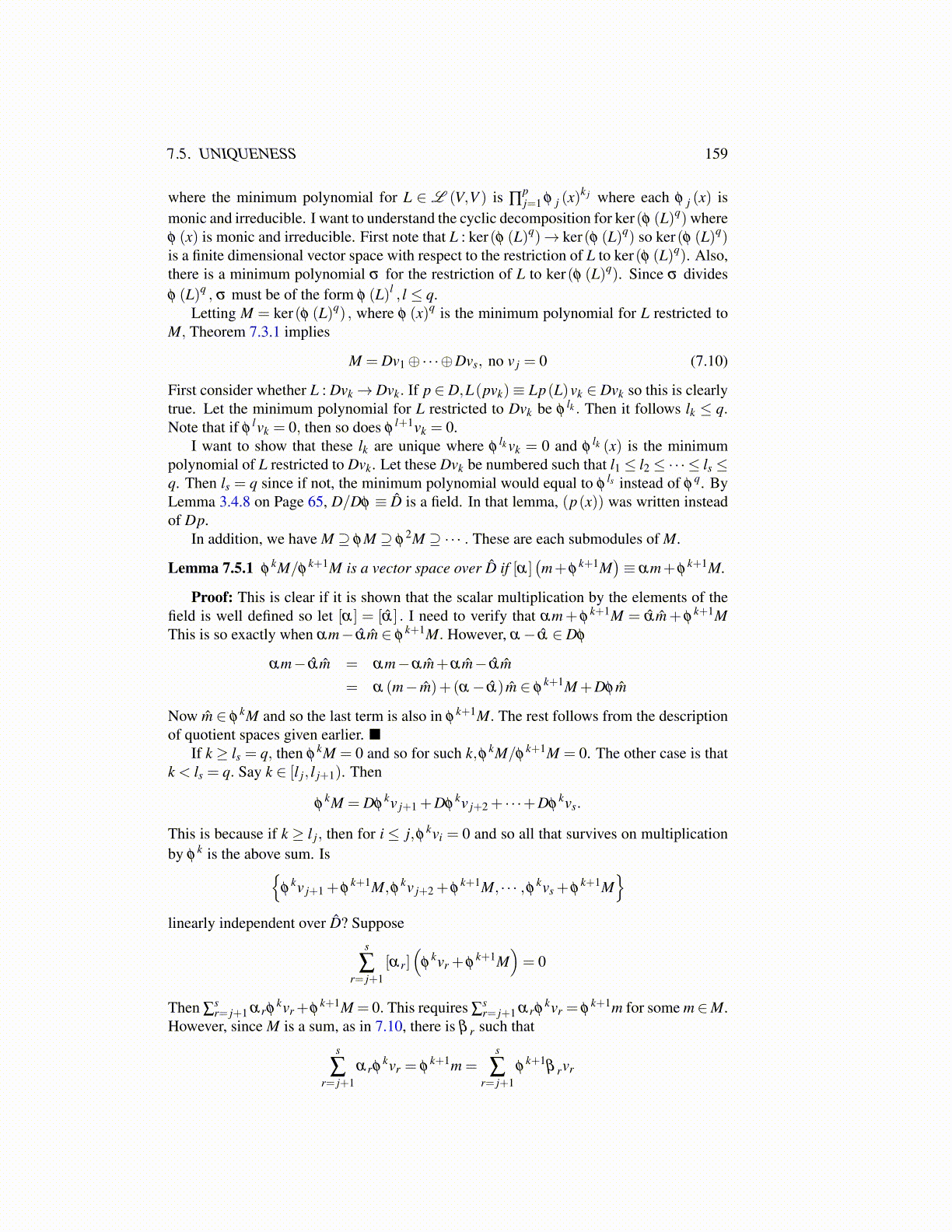
7.5. UNIQUENESS 159
where the minimum polynomial for L ∈ L (V,V ) is ∏pj=1 φ j (x)
k j where each φ j (x) ismonic and irreducible. I want to understand the cyclic decomposition for ker(φ (L)q) whereφ (x) is monic and irreducible. First note that L : ker(φ (L)q)→ ker(φ (L)q) so ker(φ (L)q)is a finite dimensional vector space with respect to the restriction of L to ker(φ (L)q). Also,there is a minimum polynomial σ for the restriction of L to ker(φ (L)q). Since σ dividesφ (L)q , σ must be of the form φ (L)l , l ≤ q.
Letting M = ker(φ (L)q) , where φ (x)q is the minimum polynomial for L restricted toM, Theorem 7.3.1 implies
M = Dv1⊕·· ·⊕Dvs, no v j = 0 (7.10)
First consider whether L : Dvk→Dvk. If p ∈D,L(pvk)≡ Lp(L)vk ∈Dvk so this is clearlytrue. Let the minimum polynomial for L restricted to Dvk be φ
lk . Then it follows lk ≤ q.Note that if φ
lvk = 0, then so does φl+1vk = 0.
I want to show that these lk are unique where φlk vk = 0 and φ
lk (x) is the minimumpolynomial of L restricted to Dvk. Let these Dvk be numbered such that l1 ≤ l2 ≤ ·· · ≤ ls ≤q. Then ls = q since if not, the minimum polynomial would equal to φ
ls instead of φq. By
Lemma 3.4.8 on Page 65, D/Dφ ≡ D̂ is a field. In that lemma, (p(x)) was written insteadof Dp.
In addition, we have M ⊇ φM ⊇ φ2M ⊇ ·· · . These are each submodules of M.
Lemma 7.5.1 φkM/φ
k+1M is a vector space over D̂ if [α](m+φ
k+1M)≡ αm+φ
k+1M.
Proof: This is clear if it is shown that the scalar multiplication by the elements of thefield is well defined so let [α] = [α̂] . I need to verify that αm+ φ
k+1M = α̂m̂+ φk+1M
This is so exactly when αm− α̂m̂ ∈ φk+1M. However, α− α̂ ∈ Dφ
αm− α̂m̂ = αm−αm̂+αm̂− α̂m̂
= α (m− m̂)+(α− α̂) m̂ ∈ φk+1M+Dφ m̂
Now m̂ ∈ φkM and so the last term is also in φ
k+1M. The rest follows from the descriptionof quotient spaces given earlier. ■
If k ≥ ls = q, then φkM = 0 and so for such k,φ kM/φ
k+1M = 0. The other case is thatk < ls = q. Say k ∈ [l j, l j+1). Then
φkM = Dφ
kv j+1 +Dφkv j+2 + · · ·+Dφ
kvs.
This is because if k ≥ l j, then for i ≤ j,φ kvi = 0 and so all that survives on multiplicationby φ
k is the above sum. Is{φ
kv j+1 +φk+1M,φ kv j+2 +φ
k+1M, · · · ,φ kvs +φk+1M
}linearly independent over D̂? Suppose
s
∑r= j+1
[αr](
φkvr +φ
k+1M)= 0
Then ∑sr= j+1 αrφ
kvr+φk+1M = 0. This requires ∑
sr= j+1 αrφ
kvr = φk+1m for some m∈M.
However, since M is a sum, as in 7.10, there is β r such thats
∑r= j+1
αrφkvr = φ
k+1m =s
∑r= j+1
φk+1
β rvr